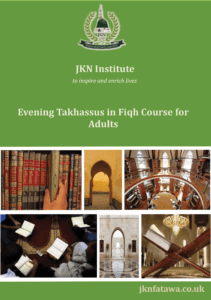Introduction
Takhassus in Fiqh is a post-graduate three years specialisation in Fiqh program delivered twice a week in the evenings at JKN Institute, Clifton Street campus, providing for both male and female graduates from traditional Islamic Institutes.
Online provision will be available for interested members residing outside of Bradford or West Yorkshire. Our Takhassus in Fiqh course has been successfully running since 2013 which entails two years of tutorial sessions and one year (the final year) of intensive independent research.
Takhassus in Fiqh course offers post-graduate students the ability to attain a comprehensive understanding of the discipline of Fiqh (Islamic jurisprudence), Usul al-Fiqh (Legal Theories), Qawaid al-Fiqh (Legal Maxims) and their applications to modern legal cases, based on the traditional Hanafi Madhab. Moreover, it allows the opportunity for students to further specialise in specific areas of Fiqh of their interest.
Throughout the course, students will gain the skills and competency to solve everyday complex juristic cases and by the end of it, they will have completed three scholastic research papers and a dissertation; each of which respectively presents an elaborative and analytical discourse on a specific contemporary legal case with the application of the Qawaid and referencing from the classical as well as contemporary sources.
Enrolment Deadline: Monday 26th September 2022 12pm
The aim of the course is to empower post-graduates to become confident researchers, writers and presenters in their specific area. To develop their research skills and ability to interpret traditional Hanafi texts and other scholarly works. The confidence to solve modern-day complex legal cases/ questions. The methodology of applying the legal principles to new cases. Furthermore, encouraging students to become lifelong researchers and finally, to embody a culture of researchers in all aspects of their domain [Fiqh].
- Specialise in specific areas of Fiqh.
- Gain the confidence to intellectually engage and interpret classical texts.
- Learn to apply classical rulings and principles to modern legal cases.
- To constructively present research work whether in written or oral form in the arena of scholars and non-scholars.
- To think and read critically.
- Confidence to explore and engage in the wider discussion of modern juristic cases.
- Appreciate the works of the pious predecessors in their methodological approach to dealing with contemporary issues.
Classes run total of 6 hours a week over two days; Tuesdays & Thursdays. Time: 7:15pm- 10:15pm
The class sessions include;
- Tutorial sessions
- Interactive group discussion, case studies, group reading from classical Arabic Fiqh manuals and analytical exercises.
- Supplementary workshops covering the following areas;
- Knowledge and awareness – A workshop related to contemporary knowledge and Jadid Masail
- Skill based – Workshops that comprise of wide range of skills that will assist and develop students to become effective Islamic researchers.
Subjects Taught in Year 1 &2
| Usul al-Fiqh
1. Qur’an 2. Sunnah |
Nurul Anwar Hussa mi |
| Fiqh | Durrul Mukhtar
Shami Badai Sanai Siraji |
| Qawaidul Fiqh | Al-Ashbah wan Nazair
Sharah Ashbah Hamawi Qawaidul Fiqh |
| Adabul Ifta wal Mufti | Rasmul Mufti
Usul al-Ifta wa Adabuhu |
| Mashqul Fatawa
Contemporary (Jadid) Masail
|
Ibn Abidin Shami
Fathul Qadir Badai Sanai Fatawa Hindiyyah Bahr ur-Raiq |
Year 3 is the intensive research year. Students are expected to write up a dissertation on their selected topic. Most of this year will be independent learning, but will be supervised and asked to attend tutorial sessions every so often.
Along side of this students must continue writing Mashq Fatawa all related to contemporary legal issues.
Shaykh Mufti Siraj
Mufti Ayyub
Mufti Abdul Aziz
Maulana Anjum Butt
Mufti Abdul Qayyoom
Mufti Abdul Waheed
Entry Requirements
Students must have successfully completed an Alimiyyah course from a recognised Islamic institute. They must be able to read classical Arabic text fluently and understand what they read to a certain degree. Interested members will be assessed before enrolling onto the course.
Students are expected to allocate a portion of their time to prepare their given work and demonstrate full commitment. Notwithstanding it being a part-time course, it allows sufficient time to manage work load.
Tuition Fee
The total fee for the full three years program is £1500. Students must pay minimum one-third of the total amount each year before sitting in the annual exams.
There are two forms of assessments each year; written exams for all subjects and research essay. Students whether online or on-site must physically attend JKN Clifton street campus for all written exams. There are two written exams each year for the first two years of the course. Students will be graded on the weekly Mashq Fatawa based on their understanding, appropriate referencing, structure and knowledge.
For the research essay; Year 1 students are expected to submit two short essays. Yearr 2 students must submit one long essay by the end of the year. Each essay will contribute 80% mark towards their mashq Fatawa written paper.
Year 3 students must complete a dissertation which will contribute 100% towards their final mark. Students will be marked on the following areas;
- Structure
- Knowledge
- Clarity
- Argument
- Referencing
Islamic research module has been incorporated into the third year of the Takhasssus in Fiqh course to equip student with the essential tools and general guidelines for academic writing and effective searching.
Objective of Islamic Research:
- Empower students to become confident in academic researchers.
- Develop research skills in:
a. Research methodology
b. Writing academic
c. Presenting research - Encourage students to become lifelong learners and teachers of research and further specialise in specific areas of their interest.
- Build a culture of academia: enquiry, analysis and research in all aspects of their work.
The supplementary Subjects will be taught throughout the three years of the course in the form of workshops.
| Subjects | Units | Sources |
| Skills | 1. Reading Skills
2. Academic Writing 3. Presentation Skills 4. Critical Thinking 5. Researching Effectively |
Personal Notes on Research Skills |
| Contemporary Fiqh | 1. Calculating Zakat
2. Contemporary Islamic Finance 3. Contemporary Muslim Family Law 4. Fiqh of Society & Muslim Minorities 5. Islamic Medical Ethics 6. Istihsan & Masalih |
Personal Notes:
Fiqhul Buyoo – Mufti Taqi Usmani
Jadid Masail – Maulana Khaild Saifullah
Fiqhi Maqalat – Mufti Taqi Usmani |
Students from Bradford and West Yorkshire must attend classes onsite. Students residing outside of West Yorkshire can apply for online provision. You must state on the application form that you want to join online.
Deadline: The final date for enrolment is Monday 26th September 2022 12pm. No new applicants will be accepted thereafter.
The course is shortlisted to 10 suitable applicants only. The application process is as follows;
Step 1: Fill in the application form. (Only fill in the form if you have successfully completed an Alim course from a traditional Islamic seminary – see entry requirement).
Step 2: Submit the form by hand or by post at the address below.
Step 3: We will then contact you to book an assessment with you. You will be assessed on your ability to translate, explain, grammar skills and interpret the text using the marginal commentary. The assessment will also include your general knowledge of your masail. Your final score will then determine your suitability for the course. Upon successfully passing the assessment, you are then required to pay £50 administration fee. This is only paid once when enrolling onto the course.
Note: Submitting your application does not guarantee your place. Only when successfully passing the assessment criteria will you then enrol onto the course.
Step 4: Once enrolled you will then be informed of the start date of the course.
All applications must be submitted to:
Al-Mumin
118 Manningham Lane
Bradford
BD8 7JF
For More Information then please contact Mufti Abdul Waheed – Teacher and Course Manager
Contact number: 01274 308456 (Mon – Fri 10am-3pm)
Email: fatawa@jkn.org.uk

